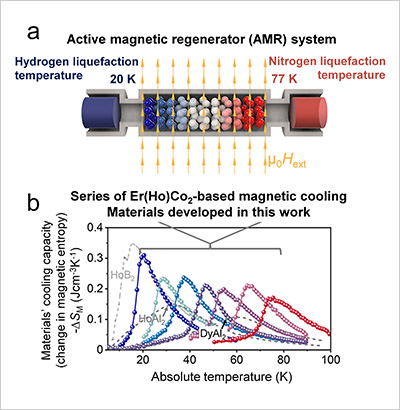Development of Magnetic Cooling Materials that Enable Efficient Hydrogen Liquefaction
—Materials to Create a Durable Hydrogen Liquefaction System—
2022.04.01
National Institute for Materials Science (NIMS)
Japan Science and Technology Agency
Tohoku University
Japan Synchrotron Radiation Research Institute
NIMS, Tohoku University and Japan Synchrotron Radiation Research Institute (JASRI) have developed a series of Er(Ho)Co2-based magnetic cooling alloys that can be used to efficiently cool hydrogen from 77 K to 20 K: its liquefaction temperature.
Abstract
- National Institute for Materials Science (NIMS), Tohoku University and Japan Synchrotron Radiation Research Institute (JASRI) have developed a series of Er(Ho)Co2-based magnetic cooling alloys that can be used to efficiently cool hydrogen from 77 K to 20 K: its liquefaction temperature. These alloys show excellent cyclic durability and can be used to develop a high performance magnetic refrigeration system capable of low-cost hydrogen liquefaction—a key technology in achieving widespread use of green fuel.
- Hydrogen fuel is expected to play an important role in promoting carbon neutral society. Hydrogen gas has large volume and its liquefaction has great advantages in terms of safety and saving space for storage and transportation. Widespread use of hydrogen will require the development of new technologies enabling production of liquid hydrogen at substantially lower cost. Magnetic refrigeration technology exploits changes in magnetic entropy in a magnetic material in response to cyclic application and removal of an external magnetic field. Removal of the magnetic field causes the magnetic moments of atoms in the material to change from aligned orientations to random orientations. This in turn causes the material to absorb heat from a refrigerant gas surrounding it, indirectly cooling and liquefying hydrogen. In theory, magnetic refrigeration technology can be 25% to more than 50% more energy-efficient than the conventional vapor compression refrigeration technology. In addition, the size of the needed equipment can be much smaller as it does not require a large compressor—a major energy consumer—potentially reducing liquid hydrogen production cost significantly. However, no existing magnetic material was able to efficiently cool hydrogen across a wide temperature range from 77 K (nitrogen liquefaction temperature) to 20 K (hydrogen liquefaction temperature) and withstand the deterioration caused by accumulated internal stress resulting from exposure to changing magnetic fields and temperatures.
- Er(Ho)Co2-based magnetic compounds had been known to be effective in cooling hydrogen from 77 K to 20 K. However, their cooling capability was not reversible due to their poor cyclic performance. These problems are overcome in this work. This research group discovered that by adding trace amounts of 3d transition metal elements make the compounds resistant to deterioration caused by repeated magnetic field application and temperature fluctuation. By adjusting the types and amounts of these additives, the group was able to develop a series of magnetic materials that can be used in combination to cool hydrogen from 77 K to 20 K without compromising their high cooling capabilities across this temperature range (figure on the right).
- This project was carried out by a research group led by Xin Tang (ICYS Research Fellow, NIMS), H. Sepehri-Amin (Principal Researcher, NIMS), Tetsuya Nakamura (Professor, Tohoku University) and Yoshinori Kotani (Senior Researcher, JASRI). This work was conducted as part of a project entitled, “Development of advanced hydrogen liquefaction system by using magnetic refrigeration technology” (program manager: Nobuyuki Nishimura, Invited Researcher, NIMS) under the JST-Mirai Program category, “Innovative hydrogen liquefaction technologies desirable in future society.”

Figure. A series of Er(Ho)Co2-based compounds developed that can be used in combination to effectively cool hydrogen from 77 K to 20 K: its liquefaction temperature.
Related files
- Research Center for Magnetic and Spintronic Materials
- Cryogenic Center for Liquid Hydrogen and Materials Science
- ICYS
Contact information
(Regarding this research)
-
H. Sepehri-Amin
Principal Researcher
Magnetic Materials Group
Research Center for Magnetic and Spintronic Materials
National Institute for Materials Science
Tel: +81-29-859-2739
E-Mail: H.SEPEHRIAMIN=nims.go.jp
(Please change "=" to "@") -
Hiroyuki Takeya
Cryogenic Center for Liquid Hydrogen and Materials Science
E-Mail: TAKEYA.Hiroyuki=nims.go.jp
(Please change "=" to "@")
(General information)
-
Public Relations Office
National Institute for Materials Science
Tel: +81-29-859-2026
Fax: +81-29-859-2017
E-Mail: pressrelease=ml.nims.go.jp
(Please change "=" to "@") -
Public Relations Division
Japan Science and Technology Agency
5-3 Yonbancho, Chiyoda-ku, Tokyo 102-8666, Japan
Tel: +81-3-5214-8404
Fax: +81-3-5214-8432
E-Mail: jstkoho=jst.go.jp
(Please change "=" to "@") -
International Center for Synchrotron Radiation Innovation Smart
Tohoku University
Tel: +81-22-217-5204
Fax: +81-22-217-5211
E-Mail: sris=grp.tohoku.ac.jp
(Please change "=" to "@")
(Regarding the SPring-8 angstrom compact free electron laser (SACLA))
-
Information and Outreach Section
User Administration Division
Japan Synchrotron Radiation Research Institute
1-1-1 Kouto, Sayo-cho, Sayo-gun, Hyogo 679-5198, Japan
Tel: +81-791-58-2785
Fax: +81-791-58-2786
E-Mail: kouhou=spring8.or.jp
(Please change "=" to "@")
(Regarding JST programs)
-
Shinichi Kato
Department of R&D for Future Creation
Japan Science and Technology Agency
K's Gobancho, 7 Gobancho, Chiyoda-ku, Tokyo 102-0076, Japan
Tel: +81-3-3512-3543
Fax: +81-3-3512-3533
E-Mail: alca=jst.go.jp
(Please change "=" to "@")
Same Keywords
-
Development of an Innovative Hydrogen Liquefaction Technology
(Magnet,Hydrogen Liquefaction,Hydrogen)
2022.04.11
-
Conventional Idea of Electronic State in High-Temperature Superconductors Is Overturned
(JASRI,Tohoku University)
2021.04.13
-
New Facility for Evaluating Hydrogen-Compatible Materials Now Complete
(Hydrogen)
2024.10.28
